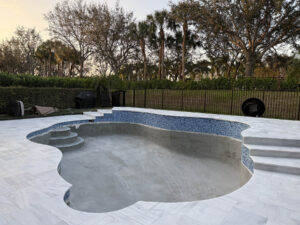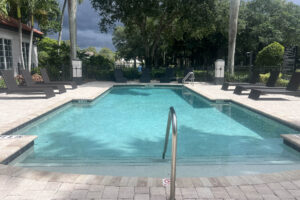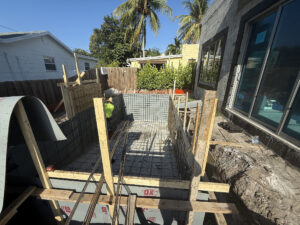Looking for practical Palm Beach pool maintenance tips? These expert insights will help you protect your pool through Florida’s harsh coastal conditions.
With its year-round sunshine, warm coastal breezes, and salt-laden air, Palm Beach, Florida, is the ultimate tropical haven. Even the winters are mild, giving pool owners like you more time to enjoy the water. But all that luxury comes with its own set of challenges — especially when it comes to keeping your pool in good condition.
The coastal weather can be especially tough on pools. Salt, humidity, rain, and hurricanes can lead to costly damage if you’re not prepared. That’s why we’ve put together these Palm Beach pool maintenance tips — so you can keep your pool looking great and running smoothly all year long.
Tip 1: Understand Why Coastal Weather Is Extra Harsh on Swimming Pools
Before you can protect your pool, it helps to understand how coastal weather affects it. Here are the biggest culprits:
Salt: Salt in the air accelerates corrosion, even on rust-resistant fixtures.
High Humidity: A breeding ground for algae and bacteria.
Tropical Rain: Dilutes your pool’s chemical balance, leading to instability.
Hurricanes and Storms: Cause debris buildup, equipment damage, and contamination.
Sunshine: UV rays degrade chlorine quickly, leaving your pool vulnerable to bacteria.
Preventing damage means going beyond generic pool care advice. These Palm Beach pool maintenance tips are tailored for a coastal climate and require more than guesswork.
Tip 2: Adjust Water Chemistry After Rainstorms
Rain dilutes chemicals and affects water balance. After a storm, test and rebalance your water using these target ranges:
| Chemical | Ideal Range | Purpose |
|---|---|---|
| pH | 7.4 – 7.6 | Maintains chlorine effectiveness |
| Free Chlorine | 1.0 – 3.0 ppm | Sanitizes pool water |
| Alkalinity | 80 – 120 ppm | Buffers pH |
| Calcium Hardness | 200 – 400 ppm | Prevents corrosion and scaling |
| Cyanuric Acid | 30 – 50 ppm | Stabilizes chlorine under sun exposure |
| Salt | 2700 – 3400 ppm | Generates chlorine in saltwater pools |
A digital water tester makes this much easier. You can also bring a water sample to your local pool store. For more on safe chemical handling, see the EPA’s Pool Chemical Safety guide.
Tip 3: Tune Up Algae Management During Summer Months
Florida’s heat and humidity are paradise for algae. To stay ahead of it:
Run your pump 8–12 hours per day
Clean skimmer and pump baskets weekly
Backwash filters after storms or heavy use
Apply algaecide monthly — more often in summer
Shock the pool weekly with chlorine or non-chlorine shock
For more targeted strategies, check out our guide on algae prevention.
And always brush your pool walls and floor — it’s the most overlooked way to stop algae in its tracks. Keeping up with these Palm Beach pool maintenance tips helps ensure algae doesn’t take hold during the hottest months.
Tip 4: Pre-Hurricane Checklist
From June to November, Palm Beach faces hurricane season. Protect your pool ahead of a storm:
Lower the water level by 1–2 feet
Remove loose furniture and equipment
Cover the pool to block debris
Shut off pumps and filters
Test and adjust chemicals before and after rain
Following this checklist can reduce storm damage and cut down your post-storm recovery time.
Tip 5: Post-Hurricane Checklist
Even with prep, storms cause messes. After a hurricane or tropical storm:
Skim debris and clean filters right away
Shock the pool
Test and rebalance chemicals
Run your pump continuously for 24–48 hours
Prompt action can save your surfaces, equipment, and water balance.
Tip 6: Winterize Your Pool
Palm Beach winters are mild, but you should still protect your pool during the colder months. Here’s how:
Keep leaves and debris out with regular cleaning
Run weekly chemical tests
Use freeze protection or run pumps during cold snaps
Add algaecide monthly
Run the pump 4–6 hours daily
Rinse salt residue off exposed metal parts weekly
Use a quality pool cover
Even in South Florida [warmer climates], a little winter prep can go a long way.
Tip 7: Invest in a High-Quality Pool Cover
A good pool cover is one of the best upgrades you can make. We recommend:
UV-resistant covers – Reduce chlorine loss and slow algae growth
Pool screens – Block debris, insects, and reduce water contamination
Both offer unique advantages — the right one depends on your priorities.
Tip 8: Schedule a Professional Checkup
Nothing beats professional service for peace of mind. A trained technician can:
Catch equipment issues before they fail
Run precision water tests
Brush and vacuum all surfaces
Recommend solutions specific to your pool and property
Check out our post on the benefits of professional pool maintenance for more info.
At Finn’s Pool Services, we offer customized plans for pool maintenance in Palm Beach designed to handle coastal conditions with ease — built around the most effective Palm Beach pool maintenance tips we’ve learned over years of service.
Final Thoughts on Palm Beach Pool Maintenance Tips
A backyard pool is one of the best parts of living in Palm Beach — but only if it’s properly maintained.
Use these Palm Beach pool maintenance tips to keep yours safe, clean, and looking great no matter the season.
Need personalized support? Call us or use our form below to contact Finn’s Pool Services for expert help.
- Phone: (561) 566-9344
- Email: [email protected]
-
Address: 1335 Old Okeechobee Rd. #450
West Palm Beach, FL 33401 - Mon – Fri: 8:00 AM – 6:00 PM
- Sat & Sun: 9:30 AM – 4:00 PM



